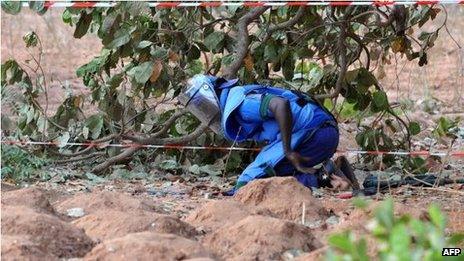Senegal female de-miner hostages freed in Casamance
- Published

Three of 12 Senegalese de-mining experts taken hostage this month by separatist rebels in Casamance in southern Senegal have been released.
Rebel leader Cesar Atoute Badiate said his group had decided to free the three women on "humanitarian grounds".
They were clearing mines for a South African firm which began working in the area around Ziguinchor in August 2012.
Separatist rebels have been fighting for independence for the Casamance region since 1982.
The government and rebels signed a peace pact at the end of 2004, raising hopes for reconciliation in Casamance, which borders The Gambia to the north and Guinea-Bissau to the south.
But a faction of the Casamance Movement of Democratic Forces (MFDC) has continued to fight.
'In tears'
The female de-miners were handed over at the village of Cassalol over the border in Guinea-Bissau to military and Red Cross officials on Monday.
The women were all in tears and made no statement, the AFP news agency reports.
Senegalese army spokesman Col Abou Thiam told the BBC French service the de-miners would be taken to Guinea-Bissau's capital, Bissau, before being transferred to Dakar.
The 12 de-mining workers were kidnapped on 3 May about 30km (18 miles) from Casamance's main city of Ziguinchor.
Robert Sagna, the ex-mayor of Ziguinchor and an influential political figure, told the Associated Press news agency that negotiations were on-going for the release of the nine other captives, who all work for the specialist de-mining company Mechem.
Last week, the UN news agency Irin reported that de-mining had been temporarily suspended in Casamance because of the kidnapping.
The Senegalese government began new peace negotiations in Rome with rebel representatives last October.
In December the MFDC freed eight hostages it had been holding for a year.
The conflict, which has killed thousands of people, broke out over claims by the region's people that they were being marginalised by the Wolof, Senegal's main ethnic group.
- Published7 May 2011